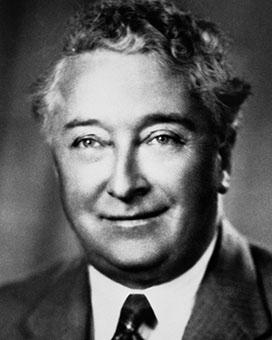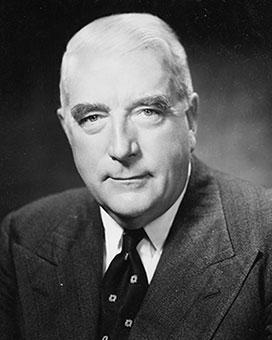Earle Christmas Grafton Page was a member of parliament for another 22 years after his brief term in the Prime Minister’s office. He served as Minister for Commerce in the Menzies and Fadden coalition governments in 1940–41, and on the Advisory War Council during John Curtin’s Labor government.
When Robert Menzies and John McEwen formed a coalition government in 1949, Page became Minister for Health, and served in Cabinet until 1956. He remained in parliament until his death on 20 December 1961, 10 days after the election in which he lost the seat he had held for 42 years.
Menzies government 1939–41
Parliament met on 3 May 1939 but until the adjournment on 16 June, sittings were few. On 3 September, Britain declared war on Germany, and Prime Minister Robert Menzies announced that Australia was thus also at war. On 6 September, Parliament was summoned.
On 13 September, Page resigned as leader of the Country Party. John McEwen lost to Archie Cameron in the ensuing leadership ballot. In the United Australia Party, Menzies’ leadership was made more secure when potential challenger Richard Casey was appointed Australia’s first Ambassador to Washington early in 1940. The difficulties in managing numbers in the House remained, and on 14 March 1940, the Country Party again joined in a coalition government.
After the federal election in September 1940, the leadership of the parliamentary Country Party was declared vacant. Earle Page and John McEwen won an equal number of votes, so Fadden was made acting leader as a temporary compromise.
Minister for Commerce 1940–41
In October 1940, Page became Minister for Commerce in the coalition government, and from January to May 1941, he was a member of the War Cabinet, while Robert Menzies was in England.
On 28 August 1941, Menzies was replaced as United Australia Party leader, and the following day Country Party leader Arthur Fadden became Prime Minister.
On 7 September, Fadden appointed Page as a special envoy in London, to report on defence issues affecting Australia and to enable the government to take a role in decision-making. On 22 September, Page left for London via Darwin, Surabaya, Singapore, Manila, Guam, Midway, Honolulu, San Francisco, Washington, Ottawa and New York, arriving finally in London on 28 October.
While Page was in Singapore en route to London, Fadden was unable to retain majority support in the House of Representatives and resigned on 7 October 1941. John Curtin became Prime Minister and Curtin directed Page to continue with his planned mission.
In Opposition 1941–49
Page was in London from October 1941 to June 1942. He attended Winston Churchill’s War Cabinet on 29 October, but disagreed with an arrangement that he should attend only when called on for issues deemed relevant and secured agreement to sit on the British War Cabinet. In February 1942, Page helped establish the Pacific War Council and negotiated a plan with Churchill for the diversion of Australian troops to Burma. These troops were about to return from the Middle East to Australia, as Curtin had requested. On 19 February 1942, the day of the bombing of Darwin, Curtin cabled his refusal of this plan to Churchill.
Page was ill with pneumonia during his last months in London. On 28 June 1942, he reached New York, and on 15 August arrived back in Australia. From 26 August until 29 September 1943, Page again served on the Advisory War Council. In April 1943, he went to Papua New Guinea with health officials to study ways to prevent malaria.
After Robert Menzies withdrew from the Advisory War Cabinet in February 1944, Page served from then until the end of the war in the Pacific in August 1945. The Country Party remained on the parliamentary cross benches until 1949.
Ethel Page usually came to Canberra for the opening of parliament, but did not live there during parliamentary sitting weeks. Page, like Menzies and William Hughes, stayed at the Hotel Canberra. After Enid Lyons was elected to parliament in 1943, she and Page usually met for breakfast in the hotel dining room. Enid Lyons said Ethel Page usually dined with Mary Hughes and William Hughes, as ‘the Doc’ never dined at the hotel.
Minister for Health 1949–56
After a coalition government replaced the Labor government of Ben Chifley in December 1949, Page joined the Cabinet as Minister for Health.
Page designed and implemented the government’s comprehensive health program including a scheme for free pharmaceuticals on an 'essential' list, maintaining free medical services for those unable to pay, a subsidised voluntary private health insurance scheme, and increased Commonwealth grants to hospitals. The National Health Act, introduced in 1953, was seen by Page as a 'bulwark against the socialisation of medicine'.
From July to September 1951, the Pages travelled in North America, where they met with US President Harry S Truman, and to Canada, investigating the systems of hospital and medical insurance. From 1 September until 22 November the following year, Page was acting Postmaster-General while HL (Larry) Anthony was overseas.
In 1955, Page was appointed the first chancellor of the University of New England.
Backbencher 1956–61
In January 1956, Page retired from the Health portfolio to the backbench, and campaigned from the government backbenches for the Clarence Gorge hydro-electric scheme. In December 1958, Ethel Page died. In July the following year, Page and his secretary Jean Thomas married in London, with Stanley Bruce as best man.
In November 1959, the all-party constitutional committee on new states that Page had initiated reported, and recommended against the proposal. That year, Page visited the United States at the invitation of voluntary health insurance organisations and also travelled to London.
Page was diagnosed with lung cancer before the 1961 federal election, but campaigned until late in November when he was taken from Grafton to Sydney’s Royal Prince Alfred for emergency surgery. He died on 20 December 1961, before the election results showed that he had lost his seat of Cowper after 42 years.
A state funeral for Page was held at St Andrew’s Cathedral in Sydney on 22 December 1961, and on 11 January 1962 a special service of thanksgiving was held to honour him in London, at the Royal Parish Church of St Martin’s-in-the-Fields.
Page was cremated. At his request, his ashes were scattered over the Clarence River near his Boolneringbar home.
Sources
- Bridge, Carl, 'Earle Christmas Grafton Page', Australian Dictionary of Biography, Vol. 11, Melbourne University Press, Melbourne
- Costar, Brian and Peter Vlahos, 'Sir Earle Page', in Michelle Grattan (ed), Australian Prime Ministers, New Holland, Sydney, 2000.
- Lyons, Enid, Among the Carrion Crows, Lansdowne, Sydney, 1972.
- Page, ECG, Truant Surgeon: The Inside Story of Forty Years of Australian Political Life, Angus & Robertson, Sydney, 1963.
- Page, Earle, 'The history of decentralisation', in Decentralisation and the New State Movement, Papers of the Armidale Convention, June 1948.
From the National Archives of Australia collection
- Appointment of Sir Earle Page as co-opted member of War Cabinet and the Advisory War Council, 1942–43, NAA: A5954, 721/19
- Reports by Sir Earle Page on ‘Investigation into Malaria’, 1943, NAA: MP729/6, 42/401/420
- Free milk scheme for children – Policy, 1950–60, NAA: A4940, C5
- National Health Service – hospitals and medical insurance schemes – Decision 582, 1956, NAA: A4926, 471





